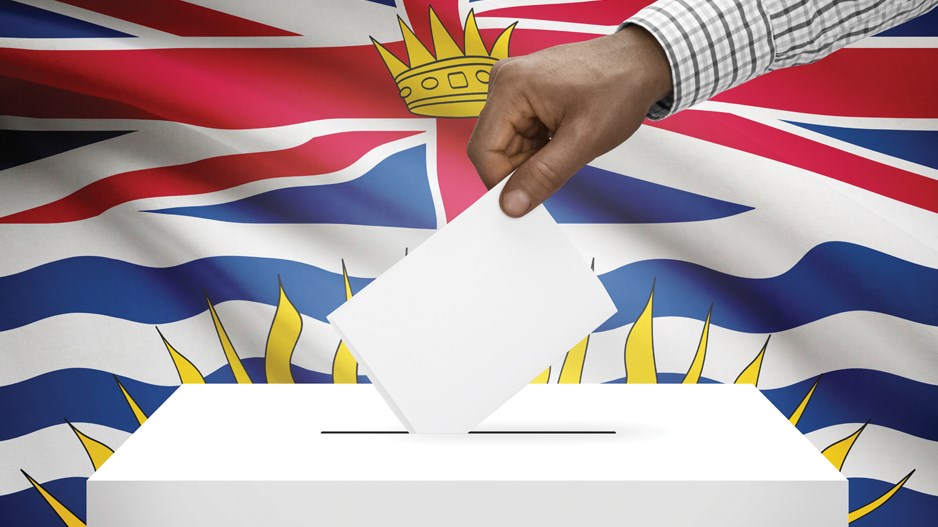When the outgoing prime minister of the United Kingdom, Rishi Sunak, delivered his first concession speech on election night, he stood on stage in a community centre gym alongside another candidate with a garbage can on his head and a person with a ventriloquist’s dummy perched on his arm.
It looked absurd. And yet, it was a far more authentic representation of our democratic system than any we’ve seen on a British Columbia election night, or will see this Oct. 19.
The U.K. announces its 650 riding results one at a time at various counting stations across England, Scotland, Wales and Northern Ireland. It means the candidates who had the courage to stand for public office in each riding get a chance to go up on stage together to hear the results at the same time as the public.
All of this occurs inside a recognizable local venue, like a community centre, municipal hall, sports complex or school gymnasium. Local officials preside over the event, wearing things like the municipal chain of office, oddly shaped ceremonial hats and robes. The candidates wear sashes.
Everyone from the most powerful cabinet minister, to the most obscure independent, to the people who run as satirical characters in costumes, gather to hear the verdict. It’s a visual representation of the beauty of a free and open system — anyone can run and anyone can win. For a moment, they are all equal. For a moment, the voting public is in charge of dispensing power to a representative.
The winning candidate then gives a speech, while everyone else stays on stage to listen. There is polite applause and handshakes. In the crowd, various parties mingle. Repeat again and again.
Contrast that to British Columbia, where we’ve managed to successfully dehumanize our electoral process over many years.
Election night in B.C. is a series of closed-door, invite-only events by political parties, where candidates lock themselves inside bubbles with their most venomously partisan supporters, elections officials work in secret at some undisclosed location, and the millions of actual voters who took the time to cast their ballots are reduced to clicking refresh on the Elections BC website to figure out what’s going on.
It’s the driest, most boring, most impersonal, most alienating possible way to engage the public in the act of voting.
Yet, B.C. seeks to push it further.
Elections BC pursues faster, more instantaneous, online results. One day, we will no doubt be able to announce who won the election on the absolute second the polls close. All in the name of efficiency.
But will that actually be better than the U.K. process? What are we missing in B.C. with our preoccupation with online spreadsheets? Mainly, the human process, where people gather for an all-night, in-person exercise in participatory democracy.
True, it takes longer — U.K. officials were still announcing results at 6 a.m. the morning after the election. And true, it’s more work — organizing hundreds of individual announcements is no small task.
But the public speeches on election night in the U.K., broadcast by the BBC, showcased some of the benefits. Re-elected MPs from the defeated Conservative government apologized for letting voters down and pledged to re-earn their trust. Labour MPs, about to form government, waxed poetic about a new era. Sunak used his gymnasium speech in part to celebrate the orderly and peaceful transition of power that was occurring under U.K. voters.
It was, all in all, kind of refreshing.
In B.C., most voters will probably never see their local candidates in the same room together during the 28-day campaign, nor will they hear from them on election night, as candidates watch the results in private only to appear later at private events where, in some cases, the media isn’t even allowed.
The impersonal nature of the process exacerbates the many flaws that already exist within the first-past-the-post system, which continues to alienate voters by creating parliaments that fail to reflect the larger popular vote.
Meanwhile, B.C. political parties complain that politics is getting more vicious, and therefore it's harder to recruit new candidates. Our political discourse continues to splinter into silos and echo chambers.
Turning election night into a series of local community events, where the public and candidates gather together to hear the results, won’t solve all of those problems, by any means.
But it could be a very small step towards lowering the temperature. And it could allow, for a brief moment, some people to be exposed to different points of view, and perhaps recognize that their political opponents aren’t quite as evil as they are led to believe.
British Columbia should give it a try.
I’m indebted to my friend and Political Capital colleague Jeff Ferrier, from Framepoint Public Affairs, for inspiring this column. He made a more eloquent case for this change on Friday’s show. Have a listen here at the 44-minute mark.
Rob Shaw has spent more than 16 years covering B.C. politics, now reporting for CHEK News and writing for Glacier Media. He is the co-author of the national bestselling book A Matter of Confidence, host of the weekly podcast Political Capital, and a regular guest on CBC Radio.


